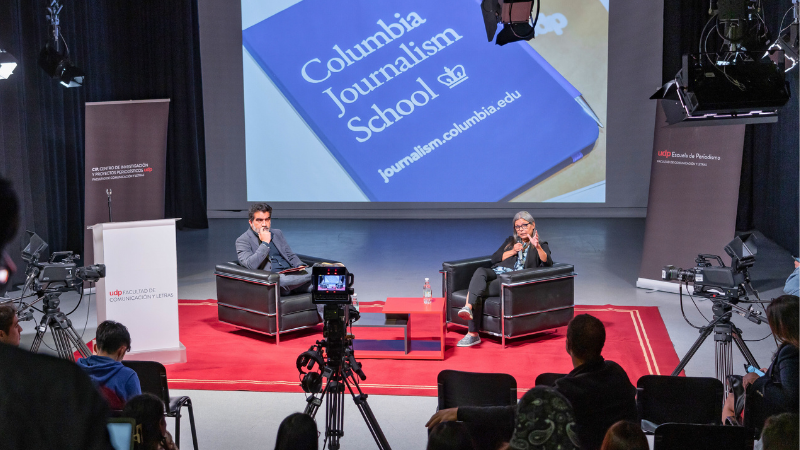Professor Giannina Segnini Addresses How Data Journalism is Changing the World at Conference in Chile
The event kicked off the academic year at Universidad Diego Portales' Journalism School.

As part of the Latin American Investigative Journalism Workshop, a collaboration between Universidad Diego Portales' (UDP) School of Journalism, Columbia University's Graduate School of Journalism, the Latin American Center for Investigative Journalism (CLIP), and Columbia Global Center Santiago, a conference titled "The Future of Data Journalism" took place on Wednesday, March 20 at UDP's television studio.
The event featured Costa Rican journalist, co-founder of CLIP, and director of the MS in Data Journalism at Columbia Giannina Segnini. She joined Fernando Morales, director of UDP's School of Journalism, in a conversation exploring investigative journalism, the use of data in the field, and access to information.
The event, which also marked the start of the academic year for the UDP Journalism School, began with opening remarks from Marcela Aguilar, dean of the School of Communications and Letters at UDP. Aguilar emphasized the importance of establishing Santiago, as a hub of experience, knowledge, and learning, radiating outwards to serve all of Latin America.
Elena Cabral, Assistant Dean of Student, Academic, and International Programs at Columbia Journalism, was also present. Highlighting the value of open-source intelligence in today's world of frequent conflicts, she noted, "The workshop that brought me to UDP is educating is equipping journalists from Chile and beyond with the latest investigative techniques using open-source intelligence, particularly important at a time of global conflict. Utilizing sources such as satellite imagery, along with digital tools, is crucial for keeping the world informed."
Cabral further highlighted the new possibilities journalism has gained through data journalism and other investigative techniques. She also encouraged UDP Journalism students to explore programs offered by Columbia Journalism School, emphasizing that "a Master's in Journalism isn't just about what you learn in class. It's about the community you build while working in this field."
The Power of Data and Its Challenges
Beyond leading Columbia's Data Journalism program, Segnini is also president of CLIP. CLIP is an editorial and investigative journalism center specializing in complex investigations and reports. They've exposed several high profile cases, including the Panama Papers, the NarcoFiles Report, the Lava Jato corruption scandal, the deforestation and illegal logging of the Amazon Rainforest, and money laundering by former Argentine President Cristina Fernández, among several others.
During their conversation, Segnini and Morales discussed the challenges of data journalism, including access to information, the use and demystification of artificial intelligence, and its unique characteristics. They also explored the importance of data journalism, its editorial value, and the collaborative, multidisciplinary nature of investigative work.
Segnini stressed the immense possibilities data journalism offers, allowing journalists to uncover and analyze vast amounts of information that would otherwise be inaccessible. "In today's world," she stated, "you simply can't be a journalist without understanding the power and potential of data for investigative work." She went on to express her constant excitement about new possibilities with data, stating, "We're living in a time of immense change, and we'll see it unfold faster than ever before. The more you work with data, the less inclined you become to share even a picture of your lunch!"
Morales raised the issue of ethical concerns surrounding artificial intelligence, particularly the biases present in tools like Chat GPT. He emphasized the need for users to understand these tools and form informed judgments about their functionality. He also pointed out the gap between younger journalists skilled with these tools and older professionals unfamiliar with them. Segnini echoed this concern, stating, “At Universities we train journalists who can work wonders with data, but then they join newsrooms and work under dinosaur editors who know nothing about this. We urgently need more training in this area." She concluded by suggesting that editors have a valuable opportunity to learn from the young journalists entering the field.
Latin America's Advantages in Data Journalism
In closing, the Columbia academic highlighted the work of CIPER Chile and other Latin American investigative media outlets. "The work CIPER does is top-notch," Segnini said. "Many of our colleagues are even teaching and working in other countries. We shouldn't underestimate the talent we have here in Latin America." She concluded by pointing out Latin America's advantages in information production, particularly regarding access to information, which she noted surpasses some European countries in certain areas.